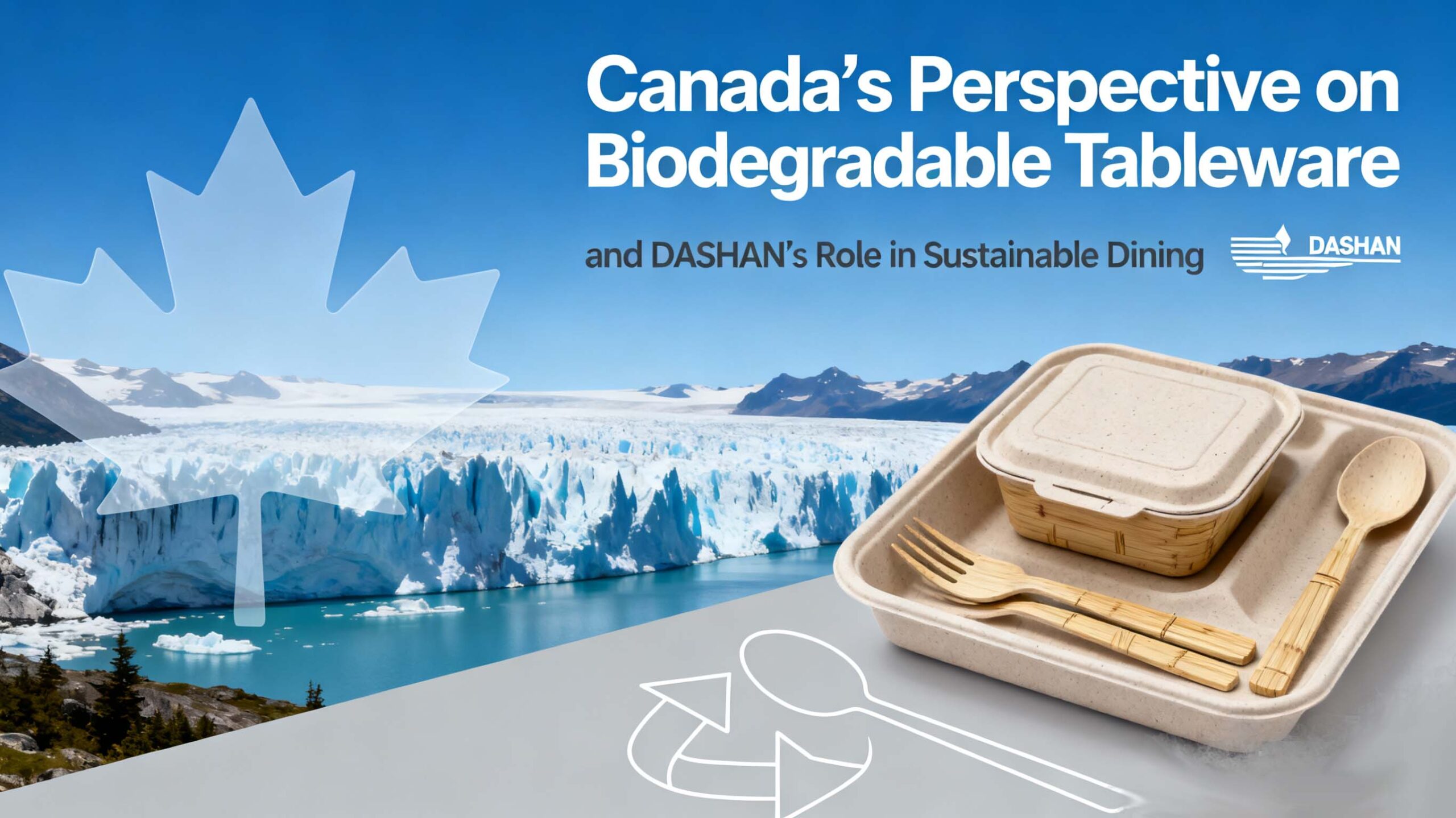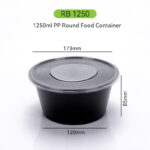Canada is taking bold action to phase out single-use plastics through federal bans and provincial initiatives, creating strong demand for biodegradable alternatives. With rising consumer awareness and supportive policies, biodegradable tableware made from cornstarch, bagasse, and PLA is gaining momentum. DASHAN provides Canadian businesses with sustainable, certified, and high-quality solutions that align with the country’s environmental goals.
Introduction

Canada, with its vast landscapes and abundant natural resources, has long been recognized as a country committed to environmental stewardship. As plastic pollution becomes one of the most pressing global issues, Canada has positioned itself as a leader in reducing single-use plastics and encouraging the adoption of eco-friendly alternatives. Among the promising solutions are biodegradable tableware products made from renewable resources such as cornstarch, sugarcane bagasse, and polylactic acid (PLA). These materials offer Canadians a way to reduce dependence on fossil fuel–based plastics while promoting a more circular and sustainable economy.
DASHAN, a manufacturer of eco-friendly packaging solutions, has emerged as a strong player in this transformation. By offering a wide range of biodegradable products—such as cornstarch cutlery, bagasse trays, and PLA cups—DASHAN supports Canadian businesses, consumers, and policymakers in their shared goal of creating a greener future.
Policy Landscape: Canada’s Approach to Single-Use Plastics
The Canadian government has made bold moves to phase out harmful single-use plastics. In 2022, Canada implemented its Single-Use Plastics Prohibition Regulations (SUPPR), banning items such as checkout bags, cutlery, stir sticks, straws, and certain food-service ware made from non-recyclable plastics. These regulations are a cornerstone of Canada’s Zero Plastic Waste Agenda, which aims to achieve zero plastic waste by 2030.
Key elements of Canadian plastic reduction policy include:
- Federal Ban: Nationwide prohibition on certain single-use plastics, with a phased implementation approach that allows industries time to adjust.
- Provincial and Municipal Actions: Provinces such as British Columbia and Quebec, along with cities like Vancouver and Montreal, have introduced their own regulations, often going beyond federal standards.
- Extended Producer Responsibility (EPR): Shifting waste management responsibility from municipalities to producers, incentivizing the use of recyclable or compostable alternatives.
These measures collectively create fertile ground for biodegradable tableware to thrive in Canada.
Consumer Awareness and Shifting Preferences
Canadian consumers are increasingly aware of the environmental footprint of their everyday choices. Surveys indicate that a majority of Canadians support stricter regulations on plastics and are willing to pay more for eco-friendly packaging. This shift is particularly evident in urban centers, where sustainable living trends are strongest.
Restaurants, cafés, and retailers are responding to consumer demand by offering compostable alternatives. Compostable coffee cups, bagasse takeout containers, and cornstarch cutlery are no longer niche products—they are becoming mainstream. Companies like DASHAN provide solutions that align with this consumer-driven momentum, helping businesses meet expectations without sacrificing functionality.
Market Dynamics: Opportunities for Biodegradable Tableware
Canada’s foodservice industry presents significant opportunities for biodegradable tableware. The rise of takeout and food delivery services—accelerated by the COVID-19 pandemic—has increased demand for disposable packaging. With plastic bans in place, biodegradable materials are the logical replacement.
- Cornstarch Products: Ideal for cutlery, straws, and containers where cost-effectiveness and biodegradability are key.
- Bagasse Products: Suited for trays, clamshells, and plates thanks to their strength, heat resistance, and compostability.
- PLA Products: Perfect for cold beverage cups and lids, offering clarity and durability without petroleum-based plastics.
DASHAN’s diversified product line strategically positions the company to meet these varied market demands.
Comparing Materials: Cornstarch, Bagasse, and PLA
To understand why biodegradable tableware is gaining traction, it’s helpful to compare the properties of these materials:
| Feature | Cornstarch | Bagasse | PLA |
|---|---|---|---|
| Source | Corn kernels | Sugarcane byproduct | Fermented plant sugars |
| Biodegradability | Industrial composting | Home & industrial composting | Industrial composting |
| Heat Resistance | Low to moderate | High (suitable for hot foods) | Moderate (cold foods/drinks) |
| Cost | Lower | Moderate | Moderate to high |
| Applications | Cutlery, packaging | Trays, clamshells, plates | Cups, lids, straws |
This comparison highlights that no single material is perfect, but collectively they cover a wide spectrum of applications, making them suitable substitutes for plastic.
Challenges and Considerations
Despite the progress, several challenges remain for biodegradable tableware adoption in Canada:
- Composting Infrastructure: Not all municipalities have industrial composting facilities capable of processing bioplastics.
- Consumer Confusion: Many consumers are uncertain about how to dispose of biodegradable items, leading to contamination of recycling streams.
- Cost Factor: Biodegradable alternatives are often more expensive than traditional plastics, creating barriers for small businesses.
Addressing these challenges requires cooperation between policymakers, producers, and educators. Companies like DASHAN play an important role in bridging the gap by not only supplying eco-friendly products but also supporting awareness initiatives.
DASHAN’s Role in Canada’s Sustainable Dining Shift

DASHAN is well positioned to contribute to Canada’s transition toward sustainable dining. By offering certified compostable products and maintaining high quality standards, the company ensures that businesses can meet regulatory requirements and consumer expectations.
Key contributions of DASHAN include:
- Product Diversity: Offering a full range of cornstarch, bagasse, and PLA-based items to cover all dining and packaging needs.
- Customization: Supporting Canadian businesses with tailored solutions, including branded packaging options.
- Sustainability Commitment: Aligning operations with international sustainability certifications and eco-labels to build trust with environmentally conscious consumers.
Through these strategies, DASHAN strengthens its presence in Canada while reinforcing its role as a global leader in biodegradable packaging.
Practical Applications in Canada
Biodegradable tableware is already being used across Canada in multiple sectors:
- Restaurants and Cafés: Compostable cups, cutlery, and containers for dine-in and takeout.
- Catering Services: Bagasse trays and clamshells for large-scale events.
- Supermarkets: Packaging for fresh produce, bakery goods, and ready-to-eat meals.
- Corporate Offices and Institutions: PLA cups and cornstarch cutlery for employee dining and events.
These applications demonstrate that eco-friendly products are not only feasible but also increasingly preferred across industries.
Future Outlook
Looking ahead, Canada’s commitment to achieving zero plastic waste by 2030 will continue to drive innovation and adoption of biodegradable tableware. Market growth will be fueled by:
- Stronger composting infrastructure.
- Continued regulatory pressure.
- Rising consumer demand for sustainable lifestyles.
As these trends converge, companies like DASHAN will play a pivotal role in making sustainable dining not just an option, but the default choice across Canada.
FAQ
-
What single-use plastics are banned in Canada?
Canada’s Single-Use Plastics Prohibition Regulations (SUPPR) ban checkout bags, cutlery, stir sticks, straws, and certain food-service ware made from non-recyclable plastics. -
Are biodegradable tableware products compostable in Canada?
Yes. Biodegradable tableware made from cornstarch, bagasse, and PLA is compostable in industrial facilities available in many Canadian provinces. -
Why are Canadian consumers choosing biodegradable alternatives?
Consumers are increasingly eco-conscious, supporting stricter plastic bans and preferring sustainable products. Many are willing to pay more for biodegradable and compostable packaging. -
How does DASHAN support Canadian businesses?
DASHAN provides certified compostable and food-safe products such as cornstarch cutlery, bagasse trays, and PLA cups, helping Canadian businesses comply with regulations and meet sustainability goals. -
What challenges does Canada face with biodegradable tableware?
Challenges include limited composting infrastructure, the need for consumer education on disposal, and higher costs compared to traditional plastics, though prices are decreasing as demand grows.
Conclusion
Canada’s proactive stance on single-use plastics, combined with growing consumer awareness and demand, makes the country a fertile ground for biodegradable tableware adoption. Cornstarch, bagasse, and PLA products are already making significant inroads, supported by both government regulation and market demand. DASHAN, with its comprehensive range of eco-friendly solutions, is uniquely positioned to support Canada’s journey toward a plastic-free future.
The path ahead may involve challenges such as infrastructure limitations and higher costs, but the direction is clear: Canada is moving steadily toward sustainable dining. With collaboration between businesses, policymakers, and consumers, biodegradable tableware will become a cornerstone of the country’s environmental legacy.
References
-
Canada’s Single-Use Plastics Prohibition Regulations (SUPPR) (Environment and Climate Change Canada) Single-use Plastics Prohibition Regulations: Overview – Canada.ca
-
“Guidance for Selecting Alternatives to Single-use Plastics” (Canada)https://www.canada.ca/en/environment-climate-change/services/managing-reducing-waste/reduce-plastic-waste/single-use-plastic-guidance.html
-
“Single-use plastic regulations, recycling and labeling rules in Canada” — BLG law firmBLG
-
“Canada’s Plastics Science Agenda” 加拿大政府
Copyright Statement
© 2025 Dashan Packing. All rights reserved.
This article is an original work created by the Dashan Packing editorial team.
All text, data, and images are the result of our independent research, industry experience,
and product development insights. Reproduction or redistribution of any part of this content
without written permission is strictly prohibited.
Dashan Packing is committed to providing accurate, evidence-based information and
to upholding transparency, originality, and compliance with global intellectual property standards.





